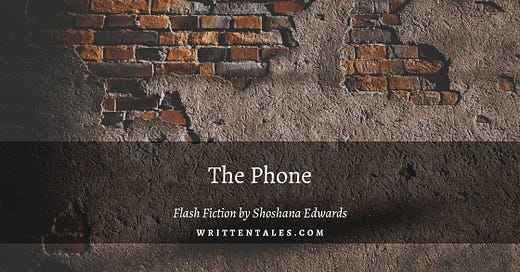If you enjoy this feature and would like to see more, let me know with a comment, 💌 share, ♥️ like, or better yet, a 🔄 restack!
You can purchase Written Tales Magazine in print or digital, or become a paid subscriber and download your favorite editions. To view our upcoming stories & poems, please visit our publishing schedule calendar.
Here I sit, alone in the cell, uncomfortable in my new clothes. I want the orange jumpsuit back. It fits. It is familiar. It is soft. I hate all these pre-death rituals: prayers with the chaplain, the talk with the warden, the last awkward meeting with my attorney. I hate my last dinner, so awful. The milkshake is too sweet; the steak is too fatty. The potatoes are salty. As soon as I finish, I dive for the lone toilet in the corner of the room, vomiting.
Awareness of the approaching deadline has stripped all animation from my face. I do not recognize the man in the warped metal mirror over the sink. The warden, the jailors, and my fellow inmates have found me to be pleasant company and a source of comfort in difficult times. Now, there is no one. They have abandoned me to my helpless isolation and dread.
“I didn’t do it, Jenny. I swear I didn’t do it,” I whisper.
Oh, how I long to hold her again, to feel the sweet softness of her breasts, the warm, moist pleasure as I enter her slowly, the urgency of our thrusting, the blissful release, the comfort afterward as we cuddle in each other’s arms, falling asleep together. But there is no conjugal visit on death row. We share a brief time together under the supervision of the warden and the priest. We are allowed to kiss, to hug, and to talk. And then she leaves. I tell her not to come, not to watch. I’ll tell her to go home to her mother, who would make her soup and sing to her and let her cry. But I know she will come. It is who she is. She will watch my final moments in stony silence, holding back her tears and screams until Momma takes her home.
My lawyer has long ago given up. I am Black, have a gap between my front teeth, and am tall and muscular. My mind plays the arrest over and over: I am wearing my sweats on my way to my car outside the gym. Me being Black and in the wrong place is enough for the cops, a close enough description from the eyewitness, to let them pull their guns. They scream at me to get down, zip tie my hands so tightly behind my back that one shoulder dislocates and ignore my screams of pain. They search my car, screaming, “Where is it? Where is the gun? Tell us now! Did you throw it away somewhere?” I cannot stop the damn movie, even after all these years.
It is sufficient that I am Black and dangerous looking, even though my hospital scrubs are on the back seat of my car, along with my ID, which shows that I am an intern at Riverpark Hospital. My gym membership badge is attached to my sweats, but no one bothers to check with the gym to learn that when the convenience store owner was shot, I was working out in the free weight room with a spotter. They know they have their man. In court, my attorney produces the evidence: the time I checked out of the hospital, the time I checked into the gym, and he calls my spotter to the stand as a witness. But even for the jury, it is sufficient that I am Black and dangerous-looking.
The movie keeps playing, and I sit here trying not to watch it, trying not to cry.
I am on death row, where I have lived for five years. We file appeal after appeal, each one failing. I have long since given up believing in truth and justice. Those are not for Black men who look dangerous, Black men with tattoos, wearing sweats, walking to their car in a White folks’ neighborhood.
They walk me down the hallway without chains, my hands free. There are five guards, including the warden. This is it. They lay me on the table, strap down my arms and legs, and the doctor inserts the needle. The curtain is pulled away from the window. Jenny is there, stony-faced and immobile, her mother sitting next to her, looking anywhere but into the death chamber. The warden reads the charges while his assistant ensures the phone on the wall is working, and the doctor confirms that the line is clear and the needle properly inserted. And then they leave, all but the man standing beside the phone, a useless gesture.
I feel a slight coldness as the first chemical is introduced, designed to relax me. It works on my body but not my mind. The terror is still there. What if I am wrong, and there is a heaven and a hell? The second drug starts, and I feel myself starting to fall asleep. Just as Morpheus begins to draw his final curtain, I hear a sound so brilliant I struggle to rise up out of the darkness. As blackness overtakes me, I identify the noise: the phone is ringing.
Shoshana Edwards is a retired teacher living in the Pacific Northwest with her husband and several feral cats they care for. In between writing, she quilts and tends her large polinator garden.





This is so poignant and so real. I was on the edge of my seat, hoping the phone would ring -- and ring in time. Brilliant.
Such a strong, visceral story. And so important to keep repeating I am a black man because that really forces the truth of what that means in America. So sorrowful, So beautifully written. Thank you